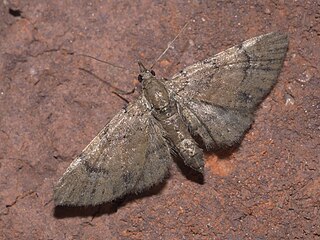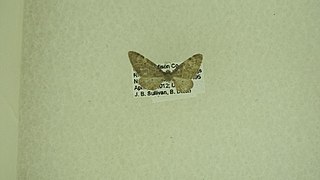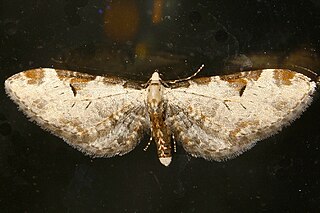
Eupithecia miserulata, the common eupithecia, is a moth of the family Geometridae. The species was first described by Augustus Radcliffe Grote in 1863 and it can be found in North America, from Ontario and Maine in the north to Florida, Mississippi, Louisiana and Texas in the south. It is also found in Arizona and California.
Eupithecia insolabilis is a moth in the family Geometridae first described by George Duryea Hulst in 1900. It is found in the southern United States, including Utah, Arizona and New Mexico.
Eupithecia catalinata is a moth in the family Geometridae first described by James Halliday McDunnough in 1944. It is found in the southern United States, including Utah, Arizona and New Mexico.

Eupithecia borealis is a moth in the family Geometridae first described by George Duryea Hulst in 1898. It is found in North America, including Alberta, Arizona, British Columbia, California, Colorado, Manitoba, Michigan, Montana, New Brunswick, New Mexico, New York, Newfoundland and Labrador, Nova Scotia, Ontario, Quebec, Utah and Wyoming.

Eupithecia jejunata is a moth in the family Geometridae. It is found in the United States, from eastern Texas, north into Arkansas and Missouri, east through Louisiana and Mississippi to Florida and north to coastal North Carolina.

Eupithecia peckorum, or Peck's pug moth, is a moth in the family Geometridae. The species was first described by Roger L. Heitzman and Wilbur R. Enns in 1977. It is found in the United States in eastern Texas, Missouri, Mississippi and Louisiana.
Eupithecia herefordaria, or Hereford's eupithecia, is a moth in the family Geometridae. It is found in south-eastern Arizona, United States.

Eupithecia matheri is a moth in the family Geometridae first described by Frederick H. Rindge in 1985. It is found in the US states of Connecticut, New York, New Jersey, Pennsylvania, Virginia, North Carolina, Mississippi, Louisiana, Texas and possibly Kansas.

Eupithecia swettii is a moth in the family Geometridae first described by John Arthur Grossbeck in 1907. It is found in eastern North America, from Quebec and Massachusetts to North Carolina in the south-east and through Missouri and Kansas to Mississippi. It is also found in eastern Texas.
Eupithecia vicksburgi is a moth in the family Geometridae first described by Frederick H. Rindge in 1985. It is found in the US state of Mississippi.
Eupithecia casloata is a moth in the family Geometridae first described by Harrison Gray Dyar Jr. in 1904. It is found in North America, including Yukon, British Columbia, Alberta, Saskatchewan, New Brunswick, Newfoundland and Labrador, Quebec, Washington, Montana, Oregon, Wyoming, Colorado, Utah, California, Maine and New Hampshire.
Eupithecia bolterii is a moth in the family Geometridae first described by George Duryea Hulst in 1900. It is found in the US states of Arizona and Texas.
Eupithecia macdunnoughi is a moth in the family Geometridae first described by Rindge in 1952. It is found in the western US states of California, Arizona, Nevada, Utah and Colorado.
Eupithecia nabokovi is a moth in the family Geometridae first described by James Halliday McDunnough in 1946. It is found in the US states of California, Arizona, New Mexico, Utah, Colorado and Wyoming.
Eupithecia nimbosa is a moth in the family Geometridae first described by George Duryea Hulst in 1896. It is widespread in the Rocky Mountains, from Arizona to the Canada–US border.
Eupithecia phyllisae is a moth in the family Geometridae first described by Rindge in 1963. It is found in the US states of New Mexico and Arizona.
Eupithecia flavigutta is a moth in the family Geometridae first described by George Duryea Hulst in 1896. It is found in the United States in Colorado and montane forest areas in eastern Arizona and south-western New Mexico.
Eupithecia hohokamae is a moth in the family Geometridae first described by Frederick H. Rindge in 1963. It is found in the United States in southern Arizona and California.
Eupithecia sinuata is a moth in the family Geometridae first described by James Halliday McDunnough in 1946. It is found in the US states of Arizona and New Mexico.

Eupithecia nevadata is a moth in the family Geometridae first described by Alpheus Spring Packard in 1871. It is found in western North America.






